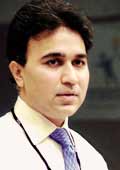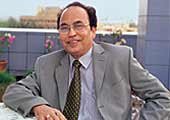 |
The
foreign hand: Memani insists E&Y India has nothing
to do with the exodus. It's a problem between them (the exiting
partners) and E&Y Global, he insists.
Rajiv Memani/CEO &
Country Managing Partner/ Ernst & Young |
A
little over two years after Arthur Andersen's Indian operations
merged with Ernst & Young India, creating an audit firm that
was, depending on whose account you went by, slightly larger or
just smaller than India's #1 audit firm PricewaterhouseCoopers,
the company's present CEO, 38-year-old Rajiv Memani is having to
revisit much-trodden ground to prove that the union was a success.
''We are better off because of the combination,'' he says. ''We
have more than doubled the size of our operations since 2002.''
He rattles off the benefits of the merger: size, growth, and the
adoption of Andersen's systems-driven style of management by Ernst
& Young India, a company that followed a more traditional approach.
Memani finds himself doing the explaining because of the exit, over
the past two months, of five partners who came in from Andersen.
Today, of the 11 worldwide partners of Andersen who signed on with
E&Y, only one, Farokh Balsara, remains. Memani finds himself
at the receiving end of questions because the recent spate of exits
has come in the wake of the March 2004 retirement of his father
Kashi Nath Memani as Chairman and Country Managing Partner. Rajiv,
who was CEO until then, a post he was elected to in November 2003,
took over the job of Country Managing Partner (see How It All Came
Unstuck). The exits, to cut to the chase, have come on his watch.
And, finally, Rajiv finds himself offering explanations because
the financial media is abuzz with reports of how the exits are a
sign of a merger gone sour, largely on account of a clash in cultures
and family-style succession at the top.
Unfortunately, that's all the explaining Rajiv
will do. The merger was a success, he repeats, and yes, the organisation
will feel the impact of the exodus. ''If we lose some accounts,''
he says in a matter-of-fact fashion, ''we will definitely make it
up.'' The CEO and his team have been busy meeting companies. Rajiv
himself has just flown in from Mumbai on the morning of his meeting
with Business Today, and he admits that he met with executives of
Reliance Infocomm in the city (that account was handled by Sanjay
Mehta, a partner who quit last month). Rajiv refuses to be drawn
into a discussion on the exits and toes the company's official line
that they revolve around some differences between the partners who
left and E&Y Global. That echoes a press statement issued by
E&Y Global that the exits were caused by the fact that the partners
did not stick to ''certain commitments made by them in connection
with their joining E&Y and their departure from Andersen Worldwide''.
Outgoing Chairman Jai Purandare counters, ''There is no such commitment.
I don't know what they are talking about.'' In response to an e-mail
sent by BT, E&Y Global spokesperson William Mutton says, ''We
have no further comment on this matter, beyond the statement that
you have already received.''
| HOW IT ALL CAME UNSTUCK |
JUNE 2002
Andersen India and Ernst & Young India merge, a union facilitated
by E&Y Global. The combination sees 23 partners (11 worldwide
partners and 12 national partners) joining E&Y from Andersen.
Post-merger, the combine had 56 partners and a total of 2,100
employees (later pruned to 1,500). Kashi N. Memani remains Chairman
and Country Managing Partner while Bobby Parikh (Andersen's
Managing Partner) becomes the CEO.
NOVEMBER 2003
Bobby Parikh resigns as CEO after he loses support of
the majority of the partners. Kashi Memani's son Rajiv is elected
CEO. Bobby's right hand man Ameet Parikh (ex Andersen) too quits.
MARCH 2004
Kashi Memani retires.
APRIL 2004
CEO Rajiv Memani takes over as the all-powerful Country Managing
Partner while Jai Purandare (ex Andersen) is elected Chairman.
He is responsible only for partner-related matters and governance.
JULY 2004
Three more partners who came in from Andersen quit: Mukesh Butani
(National Tax Director), Sanjay Mehta (head of the telecom practice)
and Lalit Ahluwalia (oil and gas).
AUGUST 2004
Chairman Jai Purandare and Head (Indirect Taxes) Rajiv Dimri
(ex Andersen) resign. Ernst & Young Global issues a press
statement to the effect that the resignation of the five partners
(Purandare, Dimri, Butani, Mehta, and Ahluwalia) has got to
do with "some unresolved differences" and unfulfilled
"commitments". The last, according to the statement,
refers to some commitment made by the Andersen partners to E&Y
Global when they joined E&Y India. Reports originate about
E&Y India's 'family' style of management. |
The Bone Of Contention
BT's investigations reveal that money is at
the core of the problem. This money-more than one person BT spoke
to used the term corpus-was reportedly the cash surpluses generated
by Andersen and put away for a rainy day. The story goes that when
the merger happened, the Andersen partners assured E&Y Global
that this money would be used for the benefit of the merged entity.
That, it continues, didn't happen, and the partners of Andersen
enriched themselves sometime back. Here, the story diverges. One
version insists that the global partners sort of split the money
between themselves (which could explain why the exits have largely
been of those people who were global partners at Andersen). And
another insists that the national partners got a share too (it even
puts a number Rs 50 lakh to Rs 75 lakh to this).
One thing BT was able to establish was that
the money did exist. Two former global partners at Andersen, one
who quit well before the merger and another who did just before
it confirm the existence of a corpus. ''There is a hell of a lot
of money at stake,'' one says. ''And that is the only reason for
this trouble.'' The exact magnitude of the corpus is anyone's guess,
although the numbers doing the round vary from Rs 70 crore to Rs
150 crore. Purandare for his part says, ''All talk of a corpus is
speculation and a mere conjecture.''
 |
Butani was reportedly
close to former E&Y Chairman and Country Managing Partner Kashi
N. Memani and his son and current CEO Rajiv. That seems to indicate
that all talk of a clash of cultures is
exaggerated.
Mukesh Butani/Former
National Tax Director/ Ernst & Young |
He and the other partners who have quit deny
that there was a corpus at all. ''This is a deflection from the
truth,'' says one. ''The house (E&Y India) is not in order and
professionals are not getting their due.'' ''Everyone is running
scared because all ex-Andersen partners could get together and do
something big,'' says another partner who recently left E&Y
India. ''So, the rumour of a corpus is being floated; we are a major
threat to them.'' ''In any case,'' asks a third partner who left,
''why should someone earning around Rs 3.5 crore a year want to
leave; we are professionals and we have a code of ethics; we left
without jobs in hand for reasons other than money.''
That would have to be the Parikh vs Memani tussle
that came to a head last November. At stake was the control of E&Y
India. A senior executive in the audit industry claims that most
E&Y partners were afraid that the crowd that came in from Andersen
would ''hijack'' their firm. This, he adds, was the main reason
for Bobby Parikh's loss in the election to the CEO's post. Another
senior executive claims that the partners were put off by Parikh's
indecisiveness and wanted a change. Parikh himself refused to speak
to BT. This tussle, the way some of the exiting partners see it
was a clash of cultures: Andersen was a professionally run MNC and
its partners expected the same thing of E&Y India which turned
out to be a family-run company.
 |
 |
Memani was
the face of
E&Y India. Some reports suggest that it was his
desire to see his son Rajiv succeed him and that this caused
the trouble. That seems unlikely
Kashi N. Memani/Former Chairman
and Country Managing Partner/ Ernst & Young India |
Parikh's
exit, in November 2003, can be directly linked to his
loss in an election for the CEO's post to Rajiv Memani. He is
reportedly considering starting a financial services business
process outsourcing firm
Bobby Parikh/Former CEO/
Ernst & Young India |
The one thing that goes against this version
is the timing: Parikh quit in November; the exits happened eight
months later although it must be said that they happened just three
months after Rajiv was made Country Managing Partner. That was the
time Kashi Memani's designation of Chairman and Country Managing
Partner was broken up and Jai Purandare, a former Andersen partner
made Chairman with powers related to governance and partnership-issues.
It is quite conceivable that this was the proverbial last straw.
Only, the exits have come four months thence, and most of the partners
who have left do not have a job in hand.
Either way, it has been a rough induction for
Rajiv. Apart from losing some of the finest minds in the business
(Rajiv Dimri and Mukesh Butani are widely reckoned to be at the
top of their respective fields in India), he now runs the risk of
losing some key accounts. Not to mention the bad press he is getting.
|
